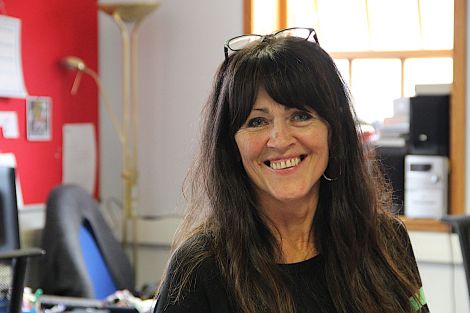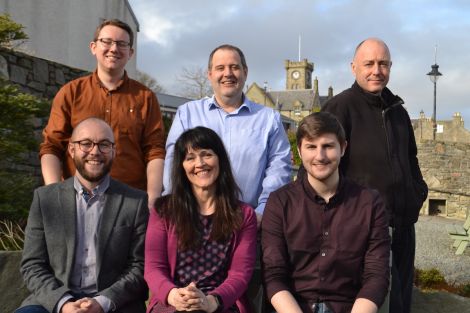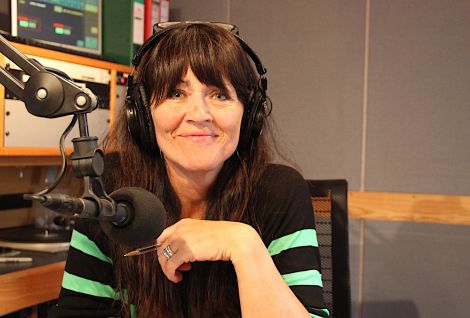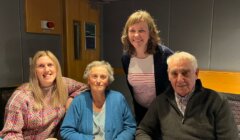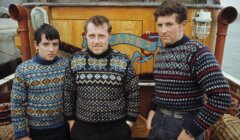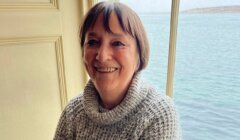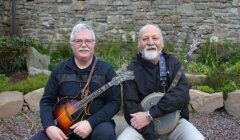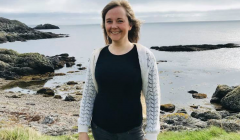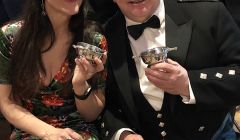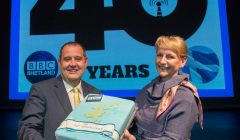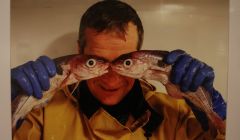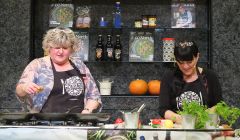Shetland Lives / Goodbye to Jane: Moncrieff bows out from local radio
Shetland’s last female news journalist retires
JANE Moncrieff, for long one of the familiar voices of Radio Shetland, retired on Friday after 20 years off and on with the isles’ BBC radio station.
Journalism was a long time coming to Jane, as she worked her way through numerous jobs, education and family life (bringing up four bairns) before starting as a presenter with Radio Shetland in 2005.
Prior to that she had numerous forays into local radio, culminating with a summer of near full-time freelancing with the BBC before taking up her permanent role.
She paid tribute to her “tremendous colleagues” and the “privilege” it has been working for local radio and learning so much about Shetland and meeting so many people.
As well as having a great appreciation for her long-standing working relationship with Mary Blance, Jane regards Mary as a true friend and her “loadstone” that she can turn to in any situation.
She is similarly warm about the working relationship and friendship she has with Radio Shetland senior producer John Johnston, who started at Radio Shetland around the same time.
There are now no full-time female news journalists in Shetland – Jane was the last of a dwindling breed – a far cry from when she started with Radio Shetland which was then dominated by women – Caroline McKenzie, Carol Anderson and Helen Smith and former Radio Shetland institution Mary Blance were in the ranks.
So, what has gone wrong with women in journalism in Shetland?
Jane said: “I do not think it is deliberate, it is just the way it’s happened. I am just sad that there are no females in general coming forward now. That is no disrespect to any of the boys that work here.
“I think female journalists sometimes have a different take on things. You might see stories that you might think are really important that your colleagues might not. It just gives a really good balance in the workplace as well.
Become a member of Shetland News
“It is also very important on radio, as it gives you a variety of voices.
“The hours in journalism do not work well for anyone who wants to have a family life,” added Jane, and she counts herself lucky to have had the support of her husband James and her family throughout her career.
She hopes there will be a resurgence of female journalists locally as there is no shortage of trained female reporters in the isles.
Dialect broadcasting has also suffered a setback with her departure – she was the last Shetland born dialect speaker at BBC Radio Shetland.
“Dialect has always been really important to me, having your own tongue. It is something we try really hard to promote at Radio Shetland, but when I leave there will not be a native born Shetland dialect speaker here. I think that is a pity.”
She is being replaced by trainee Daniel Bennett, from Northern Ireland, who she thinks will be a “terrific journalist”.
Jane was brought up and schooled in Scalloway as the oldest of four daughters. She later attended the Anderson High School, but left aged 15 hankering to get away Sooth – which meant studying hairdressing at the new Telford College in 1975 for a City and Guilds certificate.
She came home straight away, and like so many others, got a job working for oil, at the Firth camp laundry in the summer of ’77. Then followed a succession of jobs supplemented by hairdressing at home and then a stint as Harry’s first female barber.
The rest is all domestic stuff, said Jane, but at the same time she began “honing her skills” by getting involved in the Scalloway community – committees, drama and play schemes and joining the committee of the Scalloway Gala.
Shetland Folk Festival played a crucial role in her subsequent involvement with the radio.
“What really started me, I suppose, was the folk festival committee. I was asked on by Malcolm Green (then chief executive of SIC) the year they filmed a TV series,” said Jane.
The first concert she had to promote was Eric Bogle and she went along Radio Shetland, then in Market Street, where she introduced herself to Mary Blance, who asked her to do a “news voicer” followed by a programme promoting the gig itself.
That spun into Jane becoming co-presenter on the Radio Shetland arts’ programme and she was soon working occasional shifts.
“When I first started back with Mary, we had reel to reel tape recorders that only ran for 15 minutes per side and you had to physically cut the tape with a razor blade,” she said.
“I think I have had about four different types of recording machines. Now almost everything can be done via IPhones. And as well as getting the broadcasts ready, you have to think about producing content for Facebook, Instagram and Twitter.”
A couple of years later, looking through college prospectuses with Duncan, her eldest, kindled Jane’s excitement for more studying. Accepted by Napier University for a journalism course, Jane found it “quite daunting” returning as a mature student. “At that age you felt you were old, even though you weren’t, compared to where you are now,” she said.
Although Jane thoroughly enjoyed it, the course remained uncompleted owing to family bereavements. “The family needed me and I needed them, at that stage, and I just could not bide away,” she said.
Returning to Shetland with an HND in journalism, there were no reporter jobs at the time. Instead, Jane got a three-year-long job developing cruise tourism that was part funded by the Shetland Islands Tourism and Lerwick Port Authority.
There was considerable resistance to the cruise industry at the time and quite a lot of work went into getting people “on board”, she added.
After that came another spell of freelancing which included a stint with a “terrific team of folk” at the short lived Shetland Post.
During that spell, she met then Radio Shetland senior producer Alasdair Mackinnon, who was pivotal in getting Jane back to the radio.
Re-training for radio involved courses and stints in newsrooms in London, Glasgow and Aberdeen. “It just made me really glad I worked here,” quipped Jane.
Jane lists her coverage of various island games among her reporting highlights. Her first was with Malcolm Younger for STV; then followed several for the BBC.
Initially, her attitude to the games was lukewarm. “If you told me I would have ended up with a football programme at that time, I would have laughed my head off,” she said.
“I had no interest in being a sports’ reporter, but ironically that is one of the things I have ended up enjoying the most, and the only thing I have won an award for in journalism,” said Jane, referring to her Sports Reporter of the Year 2017 award.
Another unexpected accolade came when Jane and Eunice Henderson came second in the inaugural Fortnum & Mason food awards for their Shetland’s Larder programme on Ness tatties and polycrubs. “We were just thrilled beyond measure with that.”
The Leccy Pan food programme has been “tremendous” working alongside Eunice and Jill Franklin and being taken into people’s houses to sample their cooking in order to raise the profile of food in Shetland.
She would urge anyone with a desire to change their career just to go for it and try something new.
“The first time I did a programme for Radio Shetland (this is back in different days – there is no drinks cupboard anymore) John Robertson had to give me a couple of gins to settle my nerves,” she remembers.
One of the beauties of working for an “outstation team” is that you get to do a bit of everything.
“Whether it’s elections, new boats, sports, food festivals, or just taking the time to sit down and speak to somebody wi a story to tell.
“You have to be able to speak on many levels to folk. You might be speaking to a prime minister or politicians to peerie bairns,” she said.
Another advantage of working for local radio is avoiding the reporting hierarchy that exists in bigger stations – everyone mucks in with everything.
The political upheaval of recent years has been fascinating, but also frustrating as the BBC’s editorial guidelines on political ‘purdah’ means if one party is spoken to, all must be spoken to.
“The BBC have had loads of criticism over the past few years but what I find if I say I work for the BBC is that they [critics] say – ‘but you work for Radio Shetland and that’s different’.”
Some of Jane’s most memorable moments have come from highly personal and moving issues like infant mortality, where people who may have never opened up to anyone have phoned up and unburdened their grief.
“Often it is cathartic for folk to get their stories told,” said Jane.
Even if the conversations remain unbroadcast, such moments fulfil the BBC’s mission to provide a duty of care to the public, she added.
All manner of local issues that touch on tragedy or other sensitivities can make the job of the local news reporter a tricky one. There is no clear line for someone who is a journalist in the community to navigate when reporting news and respecting personal feelings.
“You have to keep your empathy and realise that these are people you might meet the next day in the local shop. I do find that hard, finding that balance between being professional and doing your job and maintaining relationships.
“Some days you go home just feeling really sad,” said Jane.
On the other hand – “you just never know what’s coming through the door here on any given day. So that makes it quite exciting”.
Jane will be 60 years young on Friday and says that she still feels youthful – she certainly looks it.
She is also physically far fitter than a few years ago, having taken up Pilates, re-started yoga, does circuit training and has gone to a personal trainer. As if that is not enough she has started running “for an experiment for a programme, that will come out after I go”.
“It is long hours and you are using your adrenaline when you are broadcasting as well. I just feel 60 is a good time to go,” she concludes. Although it is hard to believe, Jane says she is “by far the oldest person to have worked full-time at Radio Shetland”.
She hopes to spend more time with her family and her mother and stop being a “slave to the clock so much.”
Become a member of Shetland News
Shetland News is asking its many readers to consider paying for membership to get additional features and services: -
- Remove non-local ads;
- Bookmark posts to read later;
- Exclusive curated weekly newsletter;
- Hide membership messages;
- Comments open for discussion.
If you appreciate what we do and feel strongly about impartial local journalism, then please become a member of Shetland News by either making a single payment, or setting up a monthly, quarterly or yearly subscription.






